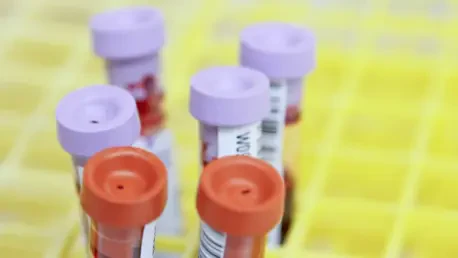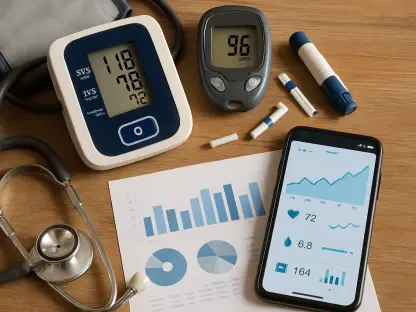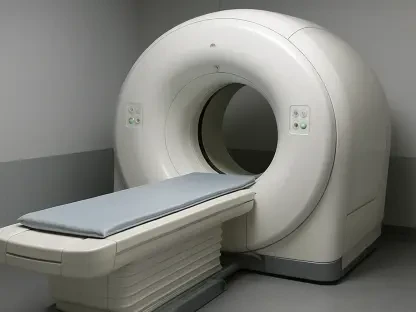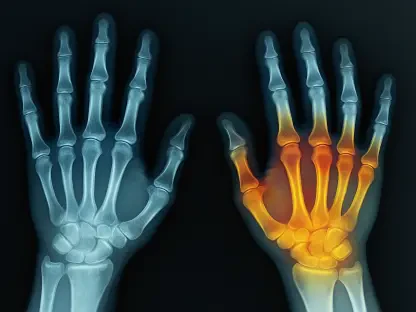The recent breakthrough in Alzheimer’s diagnosis is transforming the landscape of early detection and treatment of this neurodegenerative disease. Researchers have successfully validated a blood test that can detect the biomarker phospho-tau217 with remarkable accuracy, exceeding 90%. This innovative approach is poised to revolutionize our understanding and management of Alzheimer’s disease, offering unprecedented opportunities for early intervention. Led by the Hospital del Mar Research Institute and supported by collaboration from institutions such as BBRC, University of Gothenburg, Lund University, and the University of Brescia, the study involved a diverse cohort spanning Barcelona, Sweden, and Italy.
Early Detection and Diagnostic Accuracy
The ability to accurately detect early signs of Alzheimer’s disease through something as non-invasive as a blood test marks a significant milestone in medical diagnostics. Phospho-tau217 levels in the blood serve as reliable indicators of Alzheimer’s risk even in the preclinical stages of the condition. By employing the Lumipulse p-tau217 system, researchers developed an automated and scalable solution to measure these biomarker levels. This system effectively determines threshold levels, enabling early detection and ensuring individuals undergo further diagnostic tests such as lumbar punctures or PET scans when necessary.
The study meticulously tested and validated the accuracy of this blood test. The results showed that in hospital settings, the test’s accuracy reached over 90%, comparable to more intrusive lumbar puncture methods. However, it was noted that the test’s accuracy diminishes in primary care patients and those aged over 80 years, highlighting the need for specialized settings and considerations. The test is simple to perform and integrates seamlessly into clinical laboratory settings, making it more accessible and promoting equitable access to Alzheimer’s diagnosis.
Cost-Effectiveness and Clinical Integration
Besides its diagnostic precision, this innovative blood test provides substantial cost savings, benefiting both healthcare systems and patients. The diagnostic cost reductions range from 60% to 81% compared to existing methods, presenting a more economically viable option for widespread implementation. Such savings could significantly enhance the management and treatment of Alzheimer’s disease, allowing resources to be reallocated to other critical areas within healthcare.
Nevertheless, while promising, researchers emphasize the necessity for further studies to confirm the robustness of these findings before the blood test is adopted in routine clinical practice. Published in Nature Medicine, the study underscores the need for professional interpretation of biomarker results within a comprehensive neurological assessment framework. This ensures that the specificity of the Alzheimer’s diagnosis is maintained, preventing potential misdiagnoses and treating patients with tailored and effective care plans.
Collaboration and Future Implications
The validation of phospho-tau217 as a principal biomarker for Alzheimer’s diagnosis involved concerted efforts from multiple leading research institutes. The collaboration across Barcelona, Sweden, and Italy ensured a diverse participant pool, enhancing the study’s reliability and global applicability. Researchers accounted for patient comorbidities and different age brackets to ensure comprehensive and inclusive results. Notably, integrating such a groundbreaking diagnostic tool into standard practice reflects the high degree of innovation and scientific synergy within the international research community.
Looking ahead, the implications of this breakthrough are profound. Early and accurate detection of Alzheimer’s disease paves the way for timely therapeutic interventions, potentially slowing disease progression and improving patient outcomes. Despite the monumental strides, researchers advocate for continued exploration and refinement of the test, ensuring it becomes a staple in clinical settings worldwide. This development holds promise for reshaping Alzheimer’s diagnosis, focusing on hope and proactive management of the disease.
Conclusion
The recent breakthrough in the diagnosis of Alzheimer’s is significantly transforming early detection and treatment prospects for this neurodegenerative disorder. Researchers have successfully validated a blood test that can detect the biomarker phospho-tau217 with over 90% accuracy. This groundbreaking approach is set to revolutionize our understanding and management of Alzheimer’s, opening up unprecedented opportunities for early intervention. The study was spearheaded by the Hospital del Mar Research Institute, with crucial collaboration from institutions like BBRC, University of Gothenburg, Lund University, and the University of Brescia. The research included a diverse group of participants from Barcelona, Sweden, and Italy. This advancement not only enhances diagnostic accuracy but also paves the way for possible new treatments by identifying the disease at an earlier stage when therapeutic interventions may be more effective. As the global population ages, such innovations are crucial in mitigating the personal and societal impacts of Alzheimer’s.









